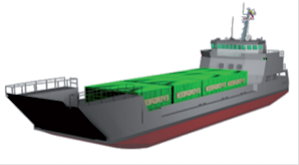Electrical design for efficiency: technical and operational measures for optimizing the use of electrical power on ships
DOI:
https://doi.org/10.25043/19098642.240Keywords:
Energy efficiency, electrical design in ships, energy consumption, maritime transportAbstract
There is currently a growing concern in the shipping industry about energy consumption and environmental impacts. According to the International Maritime Organization's (IMO) energy efficiency guidelines, today's ships must have an energy efficiency management plan to reduce the CO2 emission and other pollutants. In this article, a bibliographic review of methodologies for the optimization of energy consumption on ships is carried out, starting from the identification of sources of energy losses, to the implementation of technical and operational measures that contribute to their improvement, making a qualitative evaluation of the identified methodologies. Sources of energy losses associated with equipment and auxiliary systems are analyzed, as well as opportunities for improvement in the use of electrical energy through the implementation of intelligent energy management systems, high efficiency motors, and lighting. The technical and operational energy efficiency measures described above demonstrate the importance of their implementation from the early stages of the ship's electrical design, as well as monitoring energy consumption during its life cycle, to improve energy efficiency on board.
Downloads
References
G. IVANOVA, "Analysis of the Specifics in Calculating the Index of Existing Marine Energy Efficiency EEXI in Force since 2023," 2021 13th Electr. Eng. Fac. Conf. BulEF 2021, 2021, https://doi.org/10.1109/BulEF53491.2021.9690805
G. IVANOVA, "Specifics in Determining the Operational Energy Efficiency Index EEOI According to the Requirements of the International Maritime Organization IMO for the Period 2020-2025," 2020 12th Electr. Eng. Fac. Conf. BulEF 2020, Sep. 2020, https://doi.org/10.1109/BulEF51036.2020.9326011
ICCT, "The Energy Efficiency Design Index (EEDI) for New Ships," ICCT ICCT Policy Updat. 15, no. July 2011, 2011.
N. I. VASILIKIS, R. D. GEERTSMA, AND K. VISSER, "Operational data-driven energy performance assessment of ships: the case study of a naval vessel with hybrid propulsion," 2022, https://doi.org/10.1080/20464177.2022.2058690
M. BADR AND S. ALI AHMED, "REDUCTION OF ENERGY LOSSES IN ELECTRICAL DISTRIBUTION SYSTEMS Hamed EMAR A KASSEM EX-Chairman of Rural Electrifcation Authority-Egypt."
C. MORALES, "CT-ARC-3321-311-02 Cambio en la eficiencia de elementos eléctricos durante la vida útil y evaluación de escenarios adicionales para dimensionamiento de generadores," COTECMAR, 2017.
M. ISSA, H. IBR AHIM, H. HOSNI, A. ILINCA, AND M. REZKALLAH, "Effects of Low Charge and Environmental Conditions on Diesel Generators Operation," Eng 2020, Vol. 1, Pages 137-152, vol. 1, no. 2, pp. 137-152, Oct. 2020, https://doi.org/10.3390/eng1020009
S. CHAPMAN, Máquinas eléctricas. 2012.
P. K. KORLAK, "Multidisciplinarni znanstveni časopis POMORSTVO Multidisciplinary SCIENTIFIC JOURNAL OF MARITIME RESEARCH Comparative analysis and estimation of amounts of exhaust gas waste heat from the Tier III-compliant dual-fuel low-speed marine main engines A RT I C L E I N F O," Sci. J. Marit. Res., vol. 35, pp. 128-140, 2021, https://doi.org/10.31217/p.35.1.14
"DOE Mandates Higher Efficiency for Distribution Transformers." https://www.copper.org/environment/sustainable-energy/transformers/education/archive/dist_trans.html (accessed Nov. 29, 2022).
C. MORALES, "CT-ARC-3321-300-01 Concepto Técnico Dimensionamiento de sistemas de potencia, distribución e iluminación eléctrica," 2017.
M. DAVIDOVIC AND M. KOSTIC, "Comparison of energy efficiency and costs related to conventional and LED road lighting installations," 2022, https://doi.org/10.1016/j.energy.2022.124299
K. YIĞIT, "Evaluation of energy efficiency potentials from generator operations on vessels," Energy, vol. 257, 2022, https://doi.org/10.1016/j.energy.2022.124687

Published
How to Cite
Issue
Section
License
Copyright (c) 2023 Cotecmar

This work is licensed under a Creative Commons Attribution 4.0 International License.
The authors who publish in this Journal certify that:
- The work submitted for publication in The Ship Science and Technology journal, was written by the author, given that its content is the product of his/her direct intellectual contribution.
- All data and references to material already published are duly identified with their respective credits and are included in the bibliographic notes and quotations highlighted as such.
- All materials submitted for publication are completely free of copyrights; consequently, the author accepts responsibility for any lawsuit or claim related with Intellectual Property Rights thereof, Exonerating of responsibility to The Science and Technology for the Development of Naval, Maritime, and Riverine Industry Corporation, COTECMAR.
- In the event that the article is chosen for publication by The Ship Science and Technology journal, the author state that he/she totally transfers reproduction rights of such to The Science and Technology for the Development of Naval, Maritime, and Riverine Industry Corporation, COTECMAR.
- The authors retain the copyright and transfer to COTECMAR the right of publication and reproduction of the work which will be simultaneously subject to the Creative Commons Attribution License (CC -BY) , which allows the license to copy, distribute, display and represent the work and to make derivative works as long as it recognizes and cites the work in the manner specified by the author or licensor.
- For more information about the Creative Commons Attribution License (CC -BY) and his use and scope, please visit the following web page https://creativecommons.org/licenses/by-sa/4.0/legalcode








